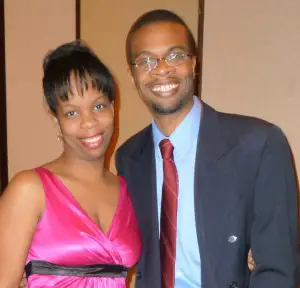
As I mentioned, I attended a really great Marriage Retreat during Valentine’s Day weekend. I went to several different sessions, but the one that stood out to me the most was called “Unshakeable Discipline”. This is how the session was described:
Unshakable Discipline
Onyechi and Deysi Oguagha
Life is hectic. Often it seems like there just aren’t enough hours in a day. Sometimes we feel like a hamster on a treadmill, running and running but getting nowhere. We ask, “How can I get everything done in a day and still maintain a wonderful marriage?” Oneychi and Deysi will tackle this issue head on in their class. They will talk about how we can prioritize the events in our lives so that we can put first things first.
Right now, my life is very full. For the most part, I like it that way – I would much rather be busy (in a good way) than bored. Since I have taken on a camp administrator position this year and my husband and I are working with the Singles ministry (150+) in our church in addition to everything else, I was eager to get some helpful tips. The class was good, but honestly I didn’t really learn anything new. That’s alright though. The truth is that there really aren’t that many new insights to living out your priorities. Rather, it’s just good to be reminded of what we already know. As moms, we know (better than many!) that knowing and doing are two different things, right? So, below are the 11 reminders that I received from this session…
1. Identify the essential from the non-essential. Only you can prioritze your life. (For me, my priorities are: God, Reggie, our kids, and then everyone and everything else.) One thing that was said that I need to remember is that you can stop for 5 minutes. Everyone/everything will still be there when you get back. So true…
2. Think small. Pick what you can do/fix (even if it’s something like vacuuming the house) and look for the little victories. This was an important reminder to celebrate the small things without being discouraged about the larger issues. This helps us to not get overwhelmed at situations. If we’re doing some of the things that we need (not necessarily want) to do without procrastinating, it helps. If we take care of the small things, the big things will take care of themselves!
3. Expect the unexpected. This was an interesting point for me, a “Pollyanna”. I get it though. We need to hope for the best, but prepare for the worst. (One point that I really liked was when the speaker noted – since he was speaking to a largely Christian audience – “faith is NOT delusional optimism”.)
4. Be flexible. As a creature of habit, parenting has especially helped me with this one! Habits are good but they can dull our perception of what is (or is not!) working in our lives. It is important to learn to think differently and adapt to various situations.
5. Slow down. One of the speakers was African and he referred to the Swahili term “polepole” which means slowly-slowly. Sometimes slower can be better. Multi-tasking is not always best because the error rates can go up as the attention span goes down. When needed, do one thing well and then move on to the next thing.
6. Get more sleep. Some studies have shown that people make more mistakes when they are sleepy then when they are drunk! Most of us need our sleep. We are not going to get more hours in the day (sorry) so what can be cut out of our schedules in order to get more sleep? The wife shared how there was a particular show that she used to stay up watching the reruns, but she decided to cut it out when necessary. (I went through my schedule after the retreat and realized that there really are enough hours in the day for me to do what I need to do IF I do what I need to do when I need to do it…)
7. Put off decisions until you are in a better mood. Basically, this point was about not making decisions when you’re feeling extremely emotional, because they can end up costing (time/energy/money) in the long run. That is so true!
8. Break a sweat. Make exercise/fun physical activity a part of your daily life. It is a positive distraction that is good for both your head and your health.
9. Be humble and get help. Life is not a competition. We all need help. Don’t wait until a particular area of your life is a mess before getting help with it. Get input along the way.
10. Deal with stress. This point was especially good for me to hear. I am a very passionate person, so I have the tendency to get riled up about things (especially what I deem to be “injustices”) – even when it really has nothing to do with me. I have to remind myself to ask these three questions: 1. Is it that important? 2. Is it reasonable for me to be angry? and 3. Is it worth compromising my health?
11. Have an ice cream and a Snickers bar. His theory: “You can’t eat ice cream and be angry.” Ice cream might not be your thing, but you get the point. Basically, this final point was just a reminder to reward ourselves and our families with whatever we like. For the most part, life is good. Have fun and enjoy it. I agree!
Final thoughts:
-“If you don’t want to clean it up, don’t mess it up.”
-“Do what you can – one day at a time.”
and from a Christian perspective:
-“Pray about the rest. Don’t stress out. Remember Philippians 4:13 “I can do everything through Him who gives me strength.”
Were any of these 11 tips helpful reminders for you?
